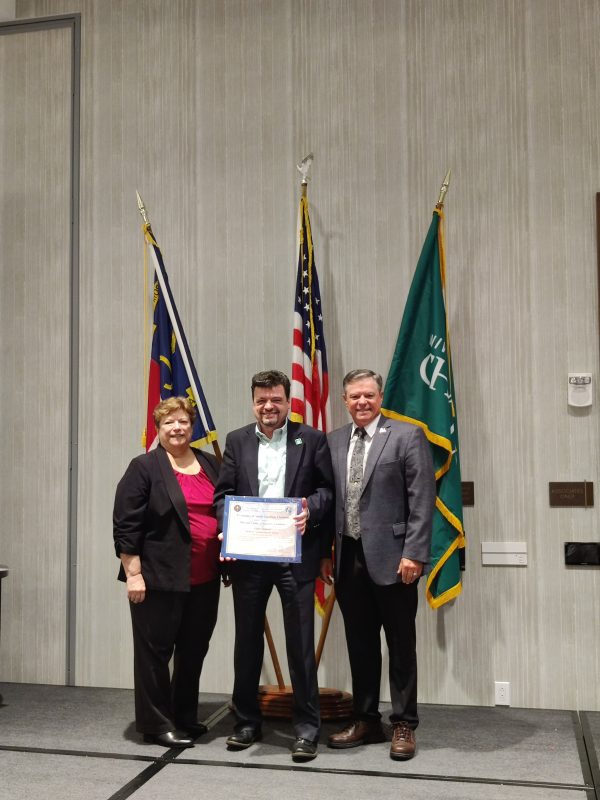UNC Charlotte Redesignated as a Center of Academic Excellence in Cyber Security Education

UNC Charlotte is redesignated as a Center of Academic Excellence in Cyber Security Education at the 2022 Southeast CAE-C Forum and Designation Ceremony Sept 28-29 at the Marriott Conference Center on UNC Charlotte campus. This designation is based on the B.S. Computer Science Program with a concentration in Cybersecurity at UNC Charlotte.
UNC Charlotte, recognized for more than two decades as national leader in cybersecurity education and research, has been redesignated by the National Security Agency as a National Center of Academic Excellence in Cyber Defense Education through the 2027-28 academic year.
Among the first U.S. universities – and the first in North Carolina – to earn CAE-CD designation in 2001 as well as the NSA’s citation for excellence in cybersecurity research in 2008, UNC Charlotte has continuously maintained NSA-credentialed status. The University’s prominence in cybersecurity has grown alongside its cybersecurity academic programs and research activity, which are contributing significantly to a safe and secure future for North Carolina and the United States.
“UNC Charlotte was known for expertise in cybersecurity before the word ‘cybersecurity’ had entered contemporary lexicon,” said Joan F. Lorden, provost and vice chancellor for academic affairs, who accepted the redesignation on behalf of UNC Charlotte at the 2022 Southeast CAE-C Forum and Designation Ceremony held last week at the UNC Charlotte Marriott Hotel and Conference Center. “The NSA’s redesignation for academic excellence – essential for continued federal research funding and support for key scholarships – speaks to Charlotte’s commitment to continued leadership in this arena. As a priority it is matched by our dedication to educating the next generation of U.S. cybersecurity experts who are uniquely qualified to prevent, identify and mitigate vulnerabilities in our national cybersecurity infrastructure.”
At the forefront of UNC Charlotte’s cybersecurity accomplishments and leadership are:
- Cyber Defense and Network Assurability (CyberDNA) Center – Established in 2001 to be a leading national center in cybersecurity and resilience research and education, UNC Charlotte’s CyberDNA Center aims to assure secure, robust and resilient cyber and cyber-physical systems for a smart, open society. With support from external funding sources – totalling nearly $45 million over the past five years alone – this is accomplished by enabling a provable, measurable, automated and active cyber defense and by elevating multidisciplinary expertise to address cybersecurity and privacy challenges for high societal-impact.
- Center for Cybersecurity Automation and Analytics – – Established in 2013 under the National Science Foundation’s Industry-University Cooperative Research Centers program, UNC Charlotte partners with George Mason University, Colorado State University and a number of industry and government organizations to advance science and state-of-the-art security analytics and automation for an automated adaptive cyber defense that includes minimal human involvement and provable, measurable security and resiliency properties.
- National Cybercorps Scholarship for Service Program – As part of the nation’s strategy to develop a superior cybersecurity workforce, the CyberCorps Scholarship for Service program provides full scholarships for undergraduate and graduate students interested in pursuing information security careers that defend U.S. cyberspace. A member of SFS since 2001 – with consistent renewal, including this fall to extend the program for up to five more years – UNC Charlotte has prepared more than 100 scholarship students for summer internships and careers with government agencies across the county.
- North Carolina Partnership for Cybersecurity Excellence – – A statewide coalition established in 2021 with funding from the NSA is accelerating the pace of cybersecurity excellence across the state and nation through targeted curriculum and skills development, work-based learning and certification support. Through cybersecurity research and service, it is driving the economic growth of North Carolina’s public agencies and private sector businesses and supporting its entrepreneurial pipeline. Members in addition to UNC Charlotte are North Carolina State University, UNC Wilmington, East Carolina University, NC A&T State University, Forsyth Technical Community College, Wake Technical Community College and Pitt Community College.
- High-quality cybersecurity academic programs and continuing education – Enrollment in the undergraduate concentration to supplement a bachelor’s degree in computer science as well as the University’s cybersecurity master’s program – the first in North Carolina, and the doctoral program averages approximately 500 students annually. In addition, IT professionals throughout the region take advantage of cybersecurity graduate certifications and bootcamp programs. The College of Computing and Informatics’ Annual Cybersecurity Symposium (Oct. 12-13), now in its 23rd year, draws hundreds of cybersecurity experts from around the country to discuss cutting-edge security issues and best practices in cybersecurity.
“With the increasing magnitude and sophistication of cyber attacks, cyber warfare has become a major threat to the security of every commercial enterprise and our national security,” said Bill Chu, professor of software and information systems and CyberDNA’s director. “UNC Charlotte’s expertise and productive partnerships with other leading universities, government and industry contribute heavily to a well-educated cybersecurity workforce; provide timely, shareable information about new discoveries as they are made; and make feasible a future that is digitally secure.”